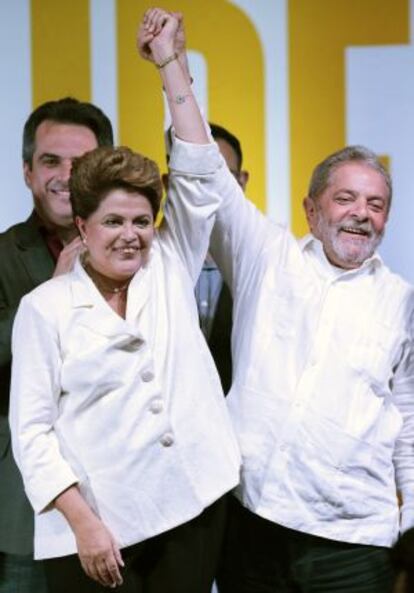Lula da Silva emerges to criticize Rousseff’s handling of government
Former Brazilian president takes aim at successor in subtle remarks before PT members


For the first time since Dilma Rousseff’s administration got caught up in a growing political and social crisis, former Brazilian President Luiz Inácio Lula da Silva emerged on Tuesday to publicly criticize the way his successor has been governing the country.
The former leader, who was in power in Brazil for two terms from 2003 to 2011, was subtle in his remarks but took clear aim at Rousseff during a rally in São Paulo that was attended by hundreds of ruling Workers Party (PT) members and union officials.
“Everyone makes mistakes,” he said. “Let’s be clear about something – we could have raised the price of gasoline in 2012, but not now.”
Rousseff, who narrowly won re-election last year, has seen her approval ratings plummet after she announced severe austerity measures, including raising the prices of gasoline and public transport and utility rates while making cuts in social spending.
There are growing rumors that tension exists between Rousseff and former President Lula da Silva
“We have had some unfavorable circumstances that were not Dilma’s own doing,” he said in defense of the economic reforms the president will present in Congress. “I made more severe adjustments in 2003.”
Once a rising global star among the developing countries, Brazil is suffering from a sluggish economy, which only grew 0.1 percent in 2014. According to the Brazil’s central bank, the economy will contract by as much a one percent this year.
“With better times [improvements in the economy], Dilma will begin readjustments in favor of the people,” Lula da Silva said.
The former Brazilian leader’s statements were carefully monitored by observers who have speculated that there is growing tension between them.
The rumors were further fueled after Rousseff named her friend Joaquím Levy – an unpopular figure among many PT members and union leaders – as her finance minister. Levy, a graduate of the University of Chicago’s business school, is also the architect behind the government’s strict cost-cutting programs at the public agencies.
Lula da Silva, who groomed Rousseff for the presidency while she served in his government, said that the recent protests and demands by the people – including those who support the president – have occurred because Brazilians have progressed socially and economically over the past 12 years during PT administrations.
But besides slowly losing support from political parties that backed her, Rousseff is also seeing her popularity wane among Brazilians who elected her. The latest poll conducted by the Brazilian Institute of Public Opinion and Statistics (Ibope) released on Wednesday shows that approval ratings among her voters had dropped last month to 34 percent from 80 percent in December.
The latest poll shows that approval ratings among her voters dropped to 34 percent from 80 percent
In one of the few interviews Rousseff has given since she began her second term in December, the president explained on Tuesday that the government has to reduce its spending in order to balance public accounts and meet fiscal target dates.
“We are going to cut and streamline government spending,” she told Bloomberg, adding that she was confident that Brazil will soon recover investor confidence.
But the social pressures remain. Opposition groups have called for protest rallies across major Brazilian cities on April 12, and the government fears they could be just as massive as the ones held on March 15.
Tu suscripción se está usando en otro dispositivo
¿Quieres añadir otro usuario a tu suscripción?
Si continúas leyendo en este dispositivo, no se podrá leer en el otro.
FlechaTu suscripción se está usando en otro dispositivo y solo puedes acceder a EL PAÍS desde un dispositivo a la vez.
Si quieres compartir tu cuenta, cambia tu suscripción a la modalidad Premium, así podrás añadir otro usuario. Cada uno accederá con su propia cuenta de email, lo que os permitirá personalizar vuestra experiencia en EL PAÍS.
¿Tienes una suscripción de empresa? Accede aquí para contratar más cuentas.
En el caso de no saber quién está usando tu cuenta, te recomendamos cambiar tu contraseña aquí.
Si decides continuar compartiendo tu cuenta, este mensaje se mostrará en tu dispositivo y en el de la otra persona que está usando tu cuenta de forma indefinida, afectando a tu experiencia de lectura. Puedes consultar aquí los términos y condiciones de la suscripción digital.








































